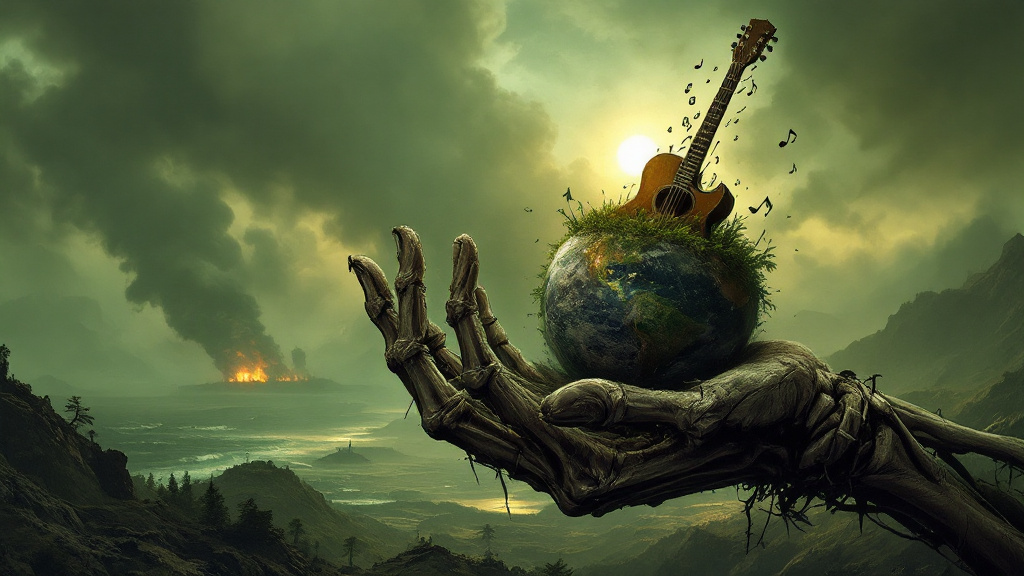
Metal music has long held a reputation as a genre that’s both rebellious and reflective, delving into social and political (politics of metal) topics with an intensity that resonates deeply with its listeners. From the sharp lyrics of Thrash Metal to the darker tones of Black Metal, this genre has carved out a unique space to confront complex societal issues. Over the decades, metal has served as a powerful lens through which fans and musicians alike explore, question, and protest the world around them.
Table of Contents
The Roots of Rebellion
Metal music emerged in the late 1960s and early 1970s amid social upheaval, as a reaction to the peace and love movement that defined rock music. Bands like Black Sabbath used dark themes to critique societal problems, such as drug abuse and war, themes that were largely ignored by mainstream music. This trend continued into the 1980s with Thrash Metal, where bands like Metallica and Megadeth addressed political issues like nuclear war, economic inequality, and government corruption in a direct, unapologetic manner.
As Metallica’s “…And Justice for All” suggests, the genre was unafraid to question authority, with lyrics that mirrored the distrust and disillusionment many felt toward political structures. Even today, these themes remain relevant as governments across the world face criticism over issues of transparency, corruption, and the widening wealth gap.
War and Oppression: A Core Theme

Metal lyrics have often explored the grim realities of war and oppression, with bands like Iron Maiden, Slayer, and System of a Down leading the charge. Iron Maiden’s “The Trooper” brings listeners into the brutality of war, while Slayeroften addresses the horrors of historical conflicts and the darkness of human nature. System of a Down has been particularly vocal about the Armenian Genocide and other forms of ethnic oppression, using their music as a platform to raise awareness and demand justice.
In today’s world, where conflicts and political unrest continue to shape global landscapes, metal remains relevant. Bands continue to produce songs that reflect both historical and contemporary struggles, giving a voice to those who feel marginalized or misunderstood. The genre’s unapologetic stance makes it a fitting vessel for stories of suffering and resistance, allowing listeners to confront uncomfortable truths.
Environmental Concerns: Metal’s Rising Voice for the Planet
Metal music has recently embraced environmentalism as a central theme, with bands using their platform to raise awareness about climate change, deforestation, pollution, and animal rights. Gojira, a band known for its environmentally conscious messages, tackles issues like ocean conservation and deforestation. Their song “Amazonia” criticizes the destruction of the Amazon rainforest, calling out the exploitation of natural resources and the loss of indigenous lands.
Environmental themes in metal reflect a growing concern for the planet, as people across the world face the consequences of climate change. Metal’s ability to communicate urgent messages through intense soundscapes makes it an effective medium to convey the dread, urgency, and frustration many feel about environmental issues. As the climate crisis intensifies, more bands are likely to incorporate environmental themes into their work, amplifying the call for action.
Racism and Social Justice: Metal’s Call for Equality
While some corners of metal have been criticized for attracting extremist ideologies, the genre has largely evolved to become a voice for inclusion, anti-racism, and social justice. Bands like Rage Against the Machine and Lamb of God have addressed issues of police brutality, systemic racism, and inequality. Rage Against the Machine, in particular, has built an entire legacy around social and political activism, using their platform to speak out against injustices.
With songs like “Killing in the Name” and “Take the Power Back”, Rage Against the Machine challenges listeners to question authority and stand against oppression. In an era where movements like Black Lives Matter have drawn global attention, metal bands continue to be part of the conversation, pushing back against discrimination and advocating for social justice.
Mental Health and Individual Struggles: Metal as a Cathartic Outlet

In addition to addressing broader societal issues, metal often explores individual struggles, including mental health, addiction, and personal trauma. Slipknot, Korn, and Linkin Park have openly addressed themes of alienation, depression, and addiction in their lyrics, providing a cathartic outlet for both themselves and their fans. With mental health emerging as a significant issue globally, particularly in the aftermath of the COVID-19 pandemic, metal’s focus on these personal struggles resonates with listeners who may feel alone in their battles.
The genre’s acceptance of vulnerability and raw emotion makes it uniquely suited to address mental health. In many ways, metal has been ahead of its time, fostering an open dialogue around issues that were once stigmatized. This willingness to confront dark, painful experiences head-on continues to make metal a haven for those seeking solidarity in their struggles.
Imagery as a Form of Protest
Metal’s imagery is as impactful as its lyrics, often featuring powerful visuals that emphasize the genre’s messages. Album covers, music videos, and stage performances commonly use dark and provocative imagery to confront societal taboos, from religious criticism to political dissent. For example, Iron Maiden’s Eddie, Megadeth’s Vic Rattlehead, and Metallica’s Lady Justice are iconic symbols that encapsulate the genre’s defiant spirit.
In live shows, bands often employ elaborate visuals to amplify their messages, creating an immersive experience that reinforces the music’s themes. These visual elements are a form of protest in themselves, challenging viewers to rethink societal norms and confront uncomfortable truths. In a world where image and appearance are highly regulated, metal’s defiant visuals stand out, pushing boundaries and making statements that resonate far beyond the music.
The Future of Metal and Political Discourse
Metal music has always been a genre unafraid of confronting the status quo. Today, with global issues such as climate change, inequality, mental health crises, and racial injustice at the forefront, metal’s role as a form of social and political commentary is more relevant than ever. As new bands emerge and established acts continue to evolve, it’s likely we’ll see an even deeper engagement with these pressing issues.
With a unique ability to channel anger, resilience, and hope, metal remains a genre for those who seek not just to be entertained but to be challenged and inspired. As metal continues to push boundaries and raise awareness, it reinforces its place as a powerful voice in the world of music, one that reflects society’s struggles and fights for a better future.
Metal may be loud, dark, and aggressive, but behind the intensity lies a deep commitment to reflecting the world’s harsh realities. From exposing the horrors of war to advocating for environmental action, the genre stands as a testament to music’s power to ignite change and inspire resistance.
